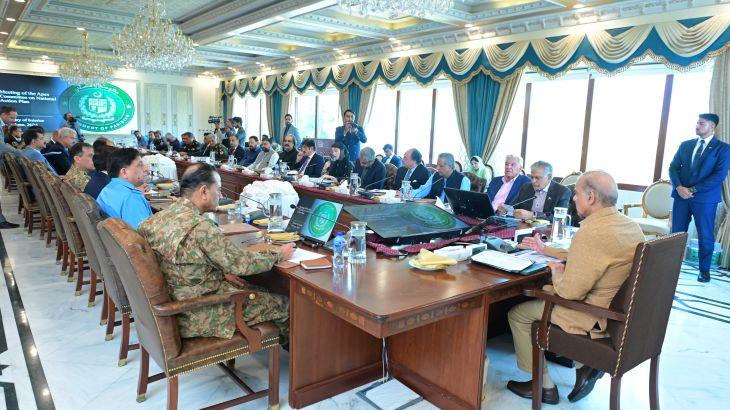Source: ALJAZEERA
ALJAZEERA MEDIA NETWORK

Amid a rise in violent incidents, Pakistan's new military operation raises questions regarding its timing and potential efficacy.
Islamabad, Pakistan – Pakistan’s leadership has sanctioned the launch of a new military initiative aimed at addressing a peak in violent incidents.
Named Azm-e-Istehkam, meaning Stability Resolve in Urdu, the operation was announced following Prime Minister Shehbaz Sharif's review of the nation’s “counterterrorism” operations over the weekend, specifically the National Action Plan implemented after the 2014 Peshawar school attack. The attack on the Army Public School in Peshawar saw over 140 deaths, mostly students, and was claimed by the Pakistan Taliban (TTP).
The new military strategy will focus on internal security threats and armed militants entering from Afghanistan, amidst growing tensions between Islamabad and the Kabul-based Taliban government. A statement from Sharif’s office on June 22 indicated plans to “intensify” efforts to counter “terrorists” through regional cooperation with Pakistan's neighbors.
“This campaign will be supported by socioeconomic measures aimed at addressing genuine public concerns and fostering an environment that discourages extremism,” the statement said.
This campaign follows a series of past military operations that Pakistan launched to counter armed violence, leading to questions about its timing and effectiveness. An earlier military operation was also announced in April 2023 during Sharif’s last term as prime minister, though it never officially began.
Though the start date for Azm-e-Istehkam remains undefined, the announcement comes amid a significant increase in violent episodes over the past 18 months. Most of these attacks are attributed to the TTP, which shares ideological ties with the Afghan Taliban.
The TTP ended a ceasefire unilaterally in November 2022, and Pakistan has repeatedly accused Kabul of sheltering them, a claim denied by the Taliban regime that took power in August 2021.
Relations, already strained, could worsen if Pakistan's military action extends into Afghan territory, predicted analysts based on recent activities.
“In March, Pakistan executed cross-border attacks in Afghanistan against supposed TTP hideouts, confirmed publicly by the foreign office,” noted Ihsanullah Tipu, a security analyst in Islamabad, during an interview with Al Jazeera.
Tipu, heading The Khorasan Diary, a portal for security analysis, added that Islamabad views active military engagement — termed kinetic action in military vernacular — as the most effective strategy to counter militancy.
Available data indicates that Pakistan experienced nearly 1,000 casualties from approximately 700 violent incidents in 2023, primarily in Khyber Pakhtunkhwa and Balochistan provinces, often targeting law enforcement.
Attacks have persisted into 2024, including incidents aimed at Chinese facilities and personnel in both northern and southern regions. A March attack on a convoy of Chinese engineers resulted in at least six fatalities, including five Chinese nationals.
China, a key ally of Pakistan, has invested $62bn in the China-Pakistan Economic Corridor (CPEC) initiative. Sharif and Pakistan’s army leader, General Asim Munir, visited China earlier this month, where securing Chinese interests was a key agenda item.
Last week, Senior Chinese official Liu Jianchao met with top Pakistani political figures to stress the importance of safeguarding Chinese interests in Pakistan. “We must enhance security and improve the business climate. The primary issue causing Chinese investors to lose confidence in Pakistan is the security situation,” Liu said on June 21 during his three-day visit.
However, Asfandyar Mir, a South Asia expert at the United States Institute of Peace (USIP), stated that while Chinese concerns likely played a role in Pakistani decisions, the timing of the new operation might be more influenced by internal political and economic factors.
“Last year, Pakistan encountered a near-financial default and had a contentious election amidst considerable political turmoil. A large-scale military operation was not feasible then,” Mir told Al Jazeera.
“With the election concluded and a government in place, and the economic situation stabilizing—albeit relatively—Pakistani leadership likely feels it now has enough domestic political bandwidth and a measure of economic stability to undertake a significant campaign to address the deteriorating security conditions,” Mir added.
Abdul Sayed, a researcher on armed groups based in Sweden, expressed doubts about the operation’s success.
Sayed noted that militant groups now mainly aim at security personnel to undermine governmental authority while trying to maintain public backing. In violence-prone provinces, a lack of public support for the security forces “could impede the operation's success,” he told Al Jazeera.
Tipu highlighted another possible hurdle: the fleeting nature of TTP bases in Pakistan and the potential for escalating tensions with Afghanistan.
“The Pakistani Taliban do not have fixed bases in Pakistan; they use temporary ones, frequently changing locations,” he said. “Cross-border operations by Pakistan into Afghanistan could escalate bilateral tensions.”
Additionally, while China has urged Pakistan to clamp down on militancy, Beijing’s strategic ties with the Taliban mean it has a different approach than Islamabad towards the current Afghan rulers, Mir explained.
“Pakistan and China differ on handling the Taliban. A military campaign, especially one with cross-border strikes to pressurize the Taliban, might conflict with Beijing's approach towards Afghanistan,” Mir cautioned.
Your email address will not be published. Required fields are marked *